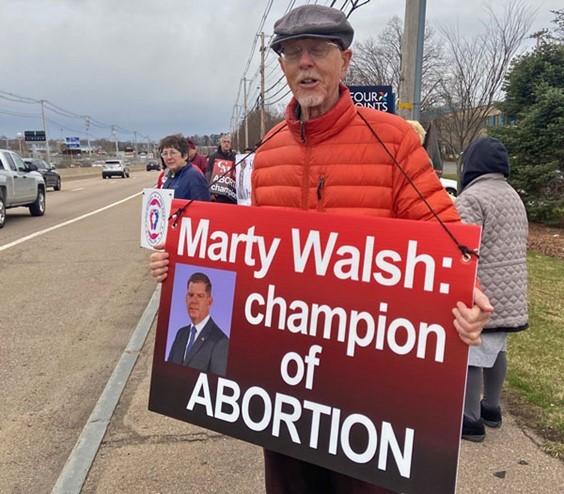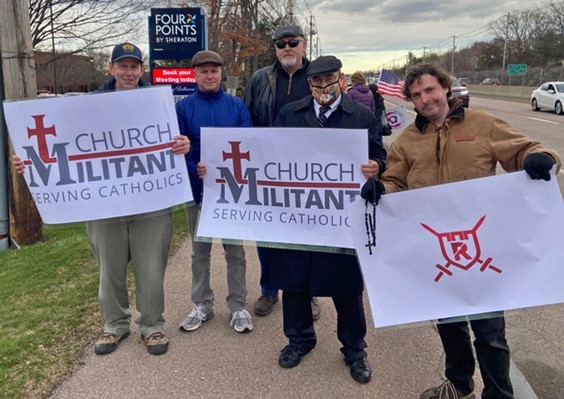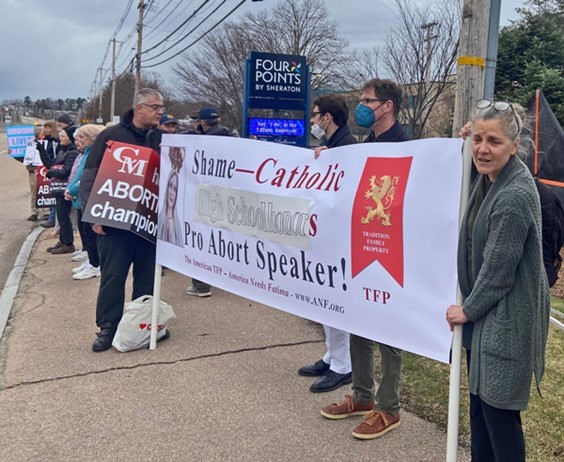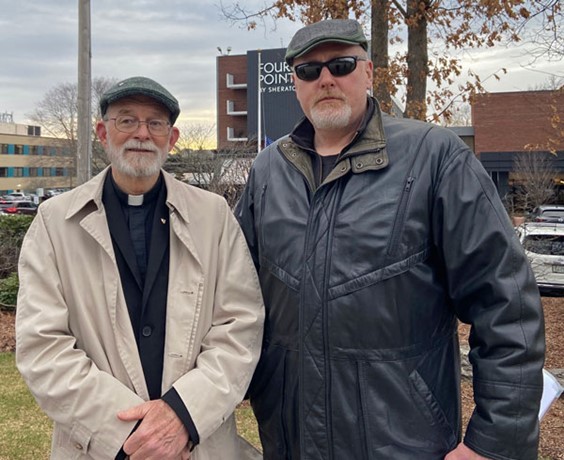THANK YOU FROM THE MASSACHUSETTS PRO-LIFE COALITION
The Massachusetts Pro-Life Coalition would like to express its sincere and profound gratitude to the more than eighty dedicated defenders of life who participated in our historic demonstration during the Catholic Memorial Gala in April, where a Catholic school, shamefully and scandalously, gave an award named after a Catholic saint to an apostle of death—Marty Walsh.
The Coalition would also like to thank all those who supported us with their prayers, and all those who helped spread the word of our response to Catholic Memorial’s unconscionable betrayal of the Catholic Faith.
A special thanks, of course, goes to Attorney Robert W. Joyce, who first engaged Catholic Memorial on this issue, who inspired this campaign, and who brought together so many members of the Coalition.
Our campaign was a success. There was not only a visible, resolute and substantial pro-life witness at the event, but the Coalition appeared in more than two dozen news stories in both the Catholic and conservative media, including Catholic News Agency, Church Militant Evening News, the Boston Broadside, the National Catholic Register, The Pilot, LifeSiteNews, and the New Boston Post.
Finally, our thanks go out to Mark Occhionero of the Church Militant Resistance, who has posted on Youtube this three and a half minute video of our demonstration, and who would like to share with all of you the following photographs of the event.
Above: Richard Regan holding the “champion of abortion” sign.
Below: Doug Fuda (left) with members of the Boston Church Militant Resistance Chapter.
Above: Leonard Rizy and Sheila Flanagan with the TFP banner.
Below: Father James Doran, OMV with a member of the Boston Church Militant Resistance Chapter.








ABORTION
Alito’s Abortion Ruling Overturning Roe Is an Insult to the 9th Amendment
The Constitution protects many more rights than it mentions, as James Madison explained.
DAMON ROOT | 6.24.2022 10:55 AM
Share on FacebookShare on TwitterShare on RedditShare by emailPrint friendly versionCopy page URL
US Supreme Court James Madison
(Illustration: Lex Villena; Fred Schilling, Collection of the Supreme Court of the United States)
At the heart of Justice Samuel Alito’s opinion in Dobbs v. Jackson Women’s Health Organization, which overturns Roe v. Wade (1973) and eliminates the constitutional right to abortion, is Alito’s objection that “the Constitution makes no mention of abortion.” For Alito and the many legal conservatives who think like him, unenumerated constitutional rights are inherently suspect. When a court recognizes an unenumerated right, these conservatives say, that court is almost certainly guilty of judicial activism.
But this conservative mindset is at odds with constitutional text and history, both of which make clear that unenumerated rights are entitled to the same respect as the small handful of rights that the Constitution specifically lists.
Remember that when the Constitution was first ratified, it did not yet contain its famous first 10 amendments, otherwise known as the Bill of Rights. Those amendments arrived a few years later. They were added in response to the fierce criticism leveled against the Constitution by the Anti-Federalists, who opposed ratification on several grounds, one of which was that the document lacked a bill of rights, and therefore, in their view, left a number of key rights unprotected (because unmentioned).
The Federalists, who labored on behalf of the Constitution’s ratification, rejected this argument. Why? Because, explained James Wilson, one of the leading figures at the Philadelphia Constitutional Convention, “if we attempt an enumeration, everything that is not enumerated is presumed to be given.” And the consequence of that, Wilson told the Pennsylvania Ratification Convention, “is, that an imperfect enumeration would throw all implied power into the scale of the government; and the rights of the people would be rendered incomplete.”
James Iredell, a future justice of the U.S. Supreme Court, made the same argument at the North Carolina Ratification Convention. “It would not only be useless, but dangerous, to enumerate a number of rights which are not intended to be given up,” he said. That is “because it would be implying, in the strongest manner, that every right not included in the exception might be impaired by the government without usurpation.” Furthermore, Iredell added, “it would be impossible to enumerate every one. Let anyone make what collection or enumeration of rights he pleases, I will immediately mention twenty or thirty more rights not contained in it.”
James Madison, one of the principal architects of the new Constitution, closely followed this debate. On June 8, 1789, he gave a speech to Congress proposing the group of amendments that would ultimately become the Bill of Rights. While doing so, he directly addressed the Anti-Federalist/Federalist debate. “It has been observed also against a bill of rights, that, by enumerating particular exceptions to the grant of power, it would disparage those rights which were not placed in that enumeration,” he said, “and it might follow by implication, that those rights which were not singled out, were intended to be assigned into the hands of the general government, and were consequently insecure.” Madison acknowledged that “this is one of the most plausible arguments I have ever heard urged against the admission of a bill of rights into this system; But, I conceive, that may be guarded against. I have attempted it.”
Madison’s attempt became enshrined in the Constitution as the Ninth Amendment. Here is what it says: “The enumeration in the Constitution of certain rights shall not be construed to deny or disparage others retained by the people.” In short, unenumerated rights get the same respect as enumerated ones.
Today, most legal conservatives purport to be constitutional originalists. What that means for the legal debate over abortion is that any purported originalist must face the question of whether abortion rights may be considered to be among the unenumerated rights “retained by the people” that Madison’s Ninth Amendment was specifically written and ratified to protect. Alito’s opinion in Dobbs v. Jackson Women’s Health Organization entirely fails to grapple with this necessary question.
Here is my answer to the question: Founding era history strongly supports the view that abortion rights, at least during the early stages of pregnancy, do fall within the orbit of Madison’s Ninth Amendment. “When the United States was founded and for many subsequent decades, Americans relied on the English common law,” explained an amicus brief filed in Dobbs by the American Historical Association and the Organization of American Historians. “The common law did not regulate abortion in early pregnancy. Indeed, the common law did not even recognize abortion as occurring at that stage. That is because the common law did not legally acknowledge a fetus as existing separately from a pregnant woman until the woman felt fetal movement, called ‘quickening,’ which could occur as late as the 25th week of pregnancy.”
William Blackstone’s widely read Commentaries on the Laws of England, first published in 1765, made this exact point: Life “begins in contemplation of law as soon as an infant is able to stir in the mother’s womb.” Under the common law, Blackstone explained, legal penalties for abortion only occurred “if a woman is quick with child, and by a potion, or otherwise, killeth it in her womb.”
Blackstone’s work was a major influence on America’s founding generation. The founders read Blackstone and they well understood that abortion was legal during the early stages of pregnancy under the common law. What is more, because every state at the time of the founding followed the common law as described by Blackstone, no state originally possessed the lawful power to prohibit abortion before quickening. We might call this the original understanding of the regulatory powers of the states.
That same original understanding extends to the Ninth Amendment. Because the states followed the common law at the founding, the American people originally understood that lawmakers lacked the lawful power to prohibit women from ending an unwanted pregnancy during its early stages. The freedom to end an unwanted pregnancy before quickening thus falls within the original meaning and understanding of a right “retained by the people.”
NEXT: Here Is a State-by-State Rundown of What Will Happen Now That SCOTUS Has Freed Lawmakers To Restrict Abortion
DAMON ROOT is a senior editor at Reason and the author of A Glorious Liberty: Frederick Douglass and the Fight for an Antislavery Constitution (Potomac Books).
Million babies, mostly blacks, have had their little arms and little legs ripped off, then their skulls crushed, and their body parts sold-off by Planned Parenthood.
It’s 2022. We know it’s a baby. We know killing a baby is murder.
It’s remanded to the states.
Women can now choose life or choose death. Their choice. They just have to convince their legislatures.
Not an issue in most states as abortion will continue up to day of birth.
Others, they’ll need bus fare, perhaps. Perhaps you can start a fund for bus fare.